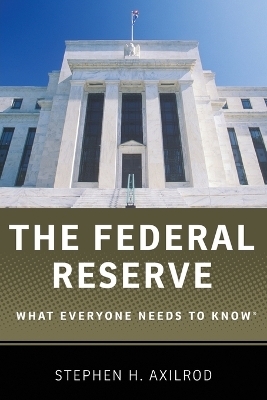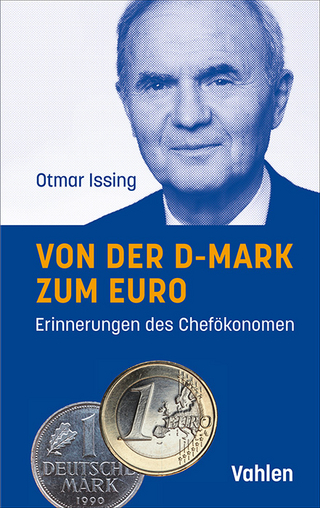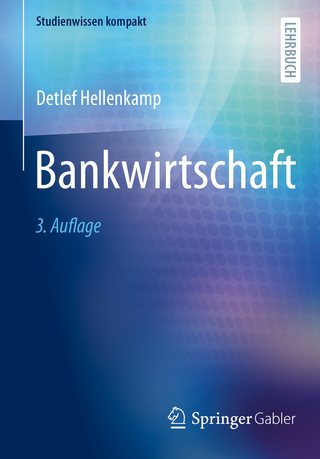
The Federal Reserve
Oxford University Press Inc (Verlag)
978-0-19-993447-8 (ISBN)
The Federal Reserve System--the central bank of the United States, better known as The Fed--has never been more controversial. Criticism has reached such levels that Congressman Ron Paul, contender for the Republican presidential nomination in 2012, published End the Fed, with blurbs from musician Arlo Guthrie and actor Vince Vaughn. And yet, amid a slow economy and partisan gridlock, the Fed has never been more important.
Stephen H. Axilrod explains this influential agency-its powers, operations, how it sets policy-in The Federal Reserve, a timely addition to Oxford's acclaimed series What Everyone Needs to Know. Of the two major governmental tools for shaping the economy, Congress controls fiscal policy-taxation and spending-and the Fed makes monetary policy-influencing how much money circulates in the economy, and how quickly. Traditionally the Fed has relied on three instruments: open-market operations (buying and selling U.S. bonds), lending to banks, and setting reserve requirements on bank deposits. It also helps to regulate the financial system.
Drawing on years of experience inside the Federal Reserve System, Axilrod shows how these tools actually work, and answers a series of increasingly detailed questions in the series format. He asks, for instance, if the system of regional Fed banks needs modification for today's technological landscape; if there is corruption in the Fed's governance; what happens to profits from its operations; the impact of political pressure; the extent of Congressional oversight; and just how independent it truly is. Whether discussing the Fed's balance sheet through the financial crisis of 2008 and beyond, the federal funds rate, or the international context, Axilrod displays a mastery of his subject
Coming in time for the Fed's 100th anniversary in 2013, this book deftly explains an institution that every American needs to understand.
Former Staff Director for Monetary and Financial Policy and Staff Director and Secretary of the Federal Open Market Committee, Board of Governors of the Federal Reserve System
Chapter 1: Background ; Why is the Federal Reserve ("the Fed") so important to the country? ; How in general does the Fed compare with other central banks? ; How does a central bank differ from other banks and financial institutions? ; If so crucial to national policy, why is the Fed independent of the government? ; Chapter 2: The Fed's Organization for Policy ; Where does responsibility for monetary policy decisions reside in the Fed? ; What does the FOMC do and how is it organized? ; How are other monetary policy instruments controlled? ; How is the politically appointed Board of Governors chosen? ; How are Reserve Banks governed? ; What role do Reserve Banks play in the policy process? ; Should the regional structure of the Fed be modified for today's world? ; Should reserve bank presidents be politically appointed? ; Do members and directors of Fed banks unduly profit or exert influence? ; What happens to the profits from Fed operations? ; What is the underlying connection between the government and the Fed? ; How does the government keep tabs on the Fed? ; What does it mean in practice to say the Fed is independent? ; Chapter 3: Basic Monetary Policy Objectives ; What are the Fed's basic objectives? ; How does the Fed take account of it economic goals? ; What role do Fed chairman play in focusing the institution's goals? ; In what sense are the objectives compatible with each other ? ; What does price stability mean? ; What makes the Fed prefer a little rather than no inflation as its practical goal? ; What inflation rate seems to satisfy the goal of price stability ; Has the Fed specified a target rate of inflation? ; Chapter 4: Instruments of Monetary Policy ; How are the Fed's monetary instruments employed in the policy process? ; Which of the Fed's instruments are most significant for implementing policy? ; How are open market operation employed? ; How does the funds rate connect with money market conditions in general? ; How does the funds rate decision affect other credit markets and spending? ; How do open market operations avoid creating too much money and inflation? ; Does the money market itself influence spending or is it mostly a policy conduit? ; Are the Fed's powers also used to influence the government market in particular?
| Reihe/Serie | What Everyone Needs To Know® |
|---|---|
| Zusatzinfo | 10 b&w line drawings |
| Verlagsort | New York |
| Sprache | englisch |
| Maße | 208 x 140 mm |
| Gewicht | 172 g |
| Themenwelt | Recht / Steuern ► Steuern / Steuerrecht |
| Wirtschaft ► Betriebswirtschaft / Management ► Finanzierung | |
| Betriebswirtschaft / Management ► Spezielle Betriebswirtschaftslehre ► Bankbetriebslehre | |
| Wirtschaft ► Volkswirtschaftslehre ► Makroökonomie | |
| Wirtschaft ► Volkswirtschaftslehre ► Wirtschaftspolitik | |
| ISBN-10 | 0-19-993447-9 / 0199934479 |
| ISBN-13 | 978-0-19-993447-8 / 9780199934478 |
| Zustand | Neuware |
| Haben Sie eine Frage zum Produkt? |
aus dem Bereich


